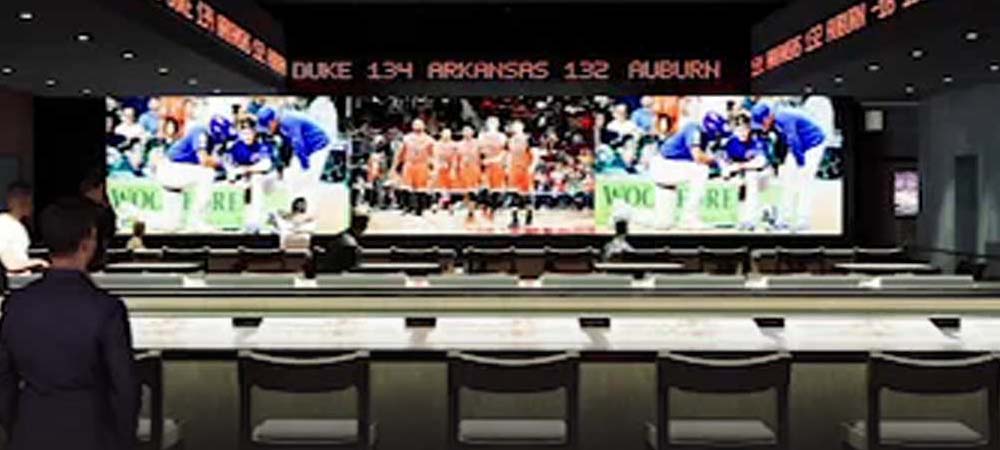- The Arkansas Racing Commission approved a new set of rules on Thursday that will allow mobile sports betting if approved by the Arkansas Legislative Council on January 28.
- Conservative estimates project a potential three-fold increase from the $1.2 million in state tax revenue generated by sports betting in 2021 with the addition of mobile sportsbooks.
LITTLE ROCK, Ark. – Arkansas is one step closer to the launch of regulated mobile sports betting after the Arkansas Racing Commission approved a new set of rules on Thursday.
Mobile Betting Could Mean Rapid Growth For Arkansas
The move to expand Arkansas’ legal sports betting industry to include mobile sports wagering will likely help the state’s already-rapidly growing industry grow even quicker.
“$33 million bet in 2020, moving to 60 million in 2021. More and more Arkansans want to participate in this [legal sports betting], and I think that’s why you see the Commission approving this,” said Scott Hardin of the Arkansas Department of Finance and Administration.
As the industry currently stands in Arkansas, sports betting is only available in-person at one of the state’s three casinos: Saracen Casino in Pine Bluff, Oaklawn Casino in Hot Springs, and Southland Casino in West Memphis. These casinos are located some distance from the majority of Arkansas’ major population centers, meaning a majority of the population does not have easy access to sports betting – the new rule changes would make legal sports betting available to everyone inside Arkansas’ borders.
“We just opened up the market to 3 million people who are no farther away from their back pocket if they want to place a wager,” said Carlton Saffa, Chief Marketing Officer of the Saracen Casino in Pine Bluff.
Mobile Expansion May Triple Tax Revenue
Legal sports betting in Arkansas is taxed at a 13% rate for the first $150 million in revenue – the tax rate then increases to 20% on all revenue above $150 million. In 2021, sports betting generated $1.2 million in state tax revenue for Arkansas, a figure Hardin believes could as much as triple in the next year with the introduction of mobile sportsbooks.
Another rule approved by the Arkansas Racing Commission was a provision that casinos retain a minimum of 51% of mobile sports betting revenue if they contract with a third-party commercial sportsbook operator such as DraftKings or FanDuel. This is very different from the policies of other states with both an in-person and mobile sports betting industry.
“But you deal with a national operator, who is essentially borrowing your license, right? They do everything under your license and in exchange for that, they say ‘here’s 5% of what we made, thanks very much,’” said Saffa.
Sportsbooks will require identification in order to register for an account, and sportsbooks will be required to utilize geo-fencing technology to ensure all bets are placed within Arkansas’ borders, to comply with federal law.
The Arkansas Legislative Council will review the rule change for approval on January 28. If approved, mobile sports betting may be in place in time for bettors to wager on the 2022 Super Bowl in February.
Advertising Disclosure
In order to provide you with the best independent sports betting news and content LegalSportsBetting.com may receive a commission from partners when you make a purchase through a link on our site.
News tags: Arkansas | Arkansas Department Of Finance And Administration | Arkansas Legislative Council | Arkansas Racing Commission | Carlton Saffa | DraftKings | FanDuel | Hot Springs | KTLO | Oaklawn Casino | Pine Bluff | Saracen Casino | Scott Hardin | Southland Casino | Super Bowl | West Memphis

Jerad has been a welcomed addition to the LegalSportsBetting.com writing team. Covering topics regarding the expansion of sports betting in the US, Jerad focuses on legislative efforts, bill signings and other methods for sports betting legalization. Finishing his education as a college baseball player, Jerad has first-hand knowledge of competitive sports, paired with years of personal sports betting as well. As a political science major at the University of Central Florida, Jerad covers the political, legal, and legislative aspects of sports gambling without any issues.


 College Football Betting
College Football Betting Best Online Sports Betting
Best Online Sports Betting Best Legal NFL Betting
Best Legal NFL Betting States With Legal Sports Betting
States With Legal Sports Betting Sports Betting Events
Sports Betting Events




